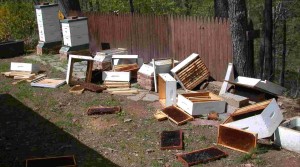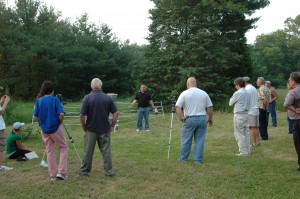 This is not a photo of beehives in Joplin, Missouri or even beehives at Wolgast Tree Farm. This photo was taken in nearby Bridgewater in central New Jersey after a bear destroyed an apiary.
This is not a photo of beehives in Joplin, Missouri or even beehives at Wolgast Tree Farm. This photo was taken in nearby Bridgewater in central New Jersey after a bear destroyed an apiary.
Most people don’t think of Bridgewater as someplace where you’d need to watch your “Ps” and “Qs” concerning bears, but bear sightings have been increasing across central New Jersey, so it’s important for everyone to learn how to minimize conflicts with bears.
Bears can be attracted to apiaries for both honey and bee brood (baby bees still in the comb). It has been estimated that damage by a bear to an apiary can cost $400 per hive. It’s also emotionally upsetting for the beekeeper, and the bees don’t like it either.
An effective means of minimizing bear damage to beehives is by surrounding them with an electric fence, so earlier this month, Wolgast Tree Farm hosted a free electric fencing clinic for beekeepers. 
Greg Miller from Gallagher Fence Company gave the clinic and explained how electric fences work, how to set them up, and how to maintain them so that they’ll actually deter a bear if one attempts to get at a hive. Handouts were also given that outlined common problems that personnel from the New Jersey Division of Fish and Wildlife have encountered when apiaries with electric fencing failed to stop bears from destroying hives.
All kinds of beekeepers came out to the farm and it was a delight to meet everyone. Hopefully, the information provided at the clinic will keep everyone’s apiary “Bear-Free”.
The New Jersey Division of Fish and Wildlife offers a plethora of information on how to minimize conflicts with bears under a variety of circumstances (not just for beekeeping), as well as information about black bear history in New Jersey, their biology, behavior, and more. Visit: http://www.njfishandwildlife.com/bearfacts.htm to get the lowdown on these intriguing and powerful creatures of the Garden State.